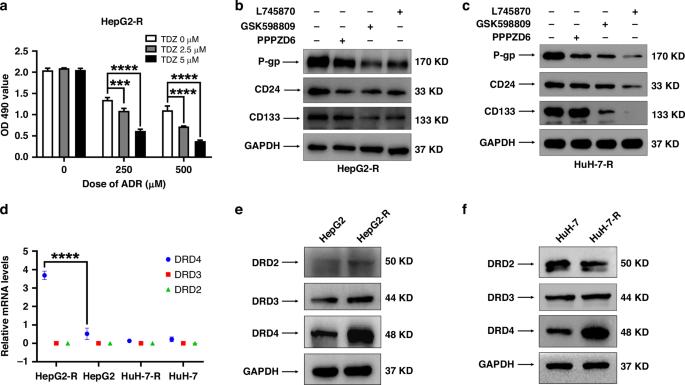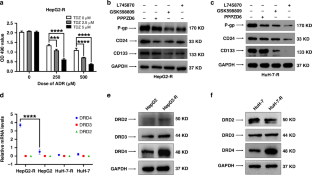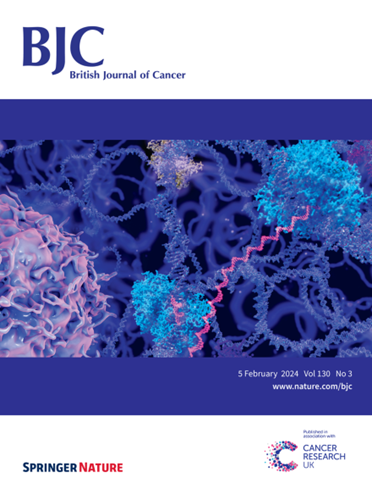DRD4 promotes chemo-resistance and cancer stem cell-like phenotypes by mediating the activation of the Akt/β-catenin signaling axis in liver cancer
IF 6.4
1区 医学
Q1 ONCOLOGY
引用次数: 0
Abstract
Liver cancer stem cells (LCSCs) significantly impact chemo-resistance and recurrence in liver cancer. Dopamine receptor D4 (DRD4) is known to enhance the cancer stem cell (CSC) phenotype in glioblastoma and correlates with poor prognosis in some non-central nervous system tumors; however, its influence on LCSCs remains uncertain. To investigate the gene and protein expression profiles of DRD4 in LCSCs and non-LCSCs, we utilized transcriptome sequencing and Western blotting analysis. Bioinformatics analysis and immunohistochemistry were employed to assess the correlation between DRD4 expression levels and the pathological characteristics of liver cancer patients. The impact of DRD4 on LCSC phenotypes and signaling pathways were explored using pharmacological or gene-editing techniques. Additionally, the effect of DRD4 on the protein expression and intracellular localization of β-catenin were examined using Western blotting and immunofluorescence. DRD4 expression is significantly elevated in LCSCs and correlates with short survival in liver cancer. The expression and activity of DRD4 are positive to resistance, self renewal and tumorigenicity in HCC. Mechanistically, DRD4 stabilizes β-catenin and promotes its entry into the nucleus via activating the PI3K/Akt/GSK-3β pathway, thereby enhancing LCSC phenotypes. Inhibiting DRD4 expression and activation offers a promising targeted therapy for eradicating LCSCs and relieve chemo-resistance.


DRD4通过介导肝癌中Akt/β-catenin信号轴的激活,促进化疗抗性和癌症干细胞样表型的形成。
背景:肝癌干细胞(LCSCs)对肝癌的化疗耐药性和复发有显著影响。众所周知,多巴胺受体D4(DRD4)可增强胶质母细胞瘤中癌症干细胞(CSC)的表型,并与一些非中枢神经系统肿瘤的不良预后相关;然而,其对LCSCs的影响仍不确定:为了研究DRD4在LCSCs和非LCSCs中的基因和蛋白表达谱,我们采用了转录组测序和Western印迹分析。方法:我们利用转录组测序和 Western 印迹分析研究了鳞癌细胞和非鳞癌细胞中 DRD4 的基因和蛋白表达情况,并通过生物信息学分析和免疫组织化学方法评估了 DRD4 表达水平与肝癌患者病理特征之间的相关性。利用药理学或基因编辑技术探讨了DRD4对LCSC表型和信号通路的影响。此外,还利用Western印迹和免疫荧光技术研究了DRD4对β-catenin蛋白表达和胞内定位的影响:结果:DRD4在LCSCs中的表达明显升高,并与肝癌患者的生存期缩短相关。DRD4的表达和活性对HCC的耐药性、自我更新和致瘤性具有积极作用。从机制上讲,DRD4能稳定β-catenin,并通过激活PI3K/Akt/GSK-3β通路促进其进入细胞核,从而增强LCSC的表型:结论:抑制DRD4的表达和激活为根除LCSCs和缓解化疗耐药性提供了一种前景广阔的靶向疗法。
本文章由计算机程序翻译,如有差异,请以英文原文为准。
求助全文
约1分钟内获得全文
求助全文
来源期刊

British Journal of Cancer
医学-肿瘤学
CiteScore
15.10
自引率
1.10%
发文量
383
审稿时长
6 months
期刊介绍:
The British Journal of Cancer is one of the most-cited general cancer journals, publishing significant advances in translational and clinical cancer research.It also publishes high-quality reviews and thought-provoking comment on all aspects of cancer prevention,diagnosis and treatment.
 求助内容:
求助内容: 应助结果提醒方式:
应助结果提醒方式:


